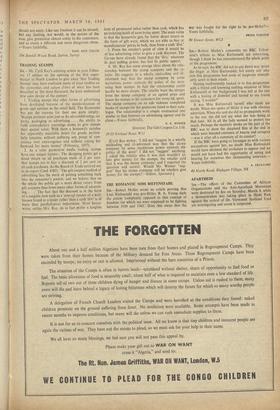TRADING STAMPS
SIR,-- Mr. Cyril Ray's amusing article in your Febru- ary 17 edition on the opening of the first super- market in North London to give away 'Star Trading Stamps' may have confused many of your readers on the economics and raison d'egre of what has been described as 'the most discussed, the least understood new sales device of the century.'
I. Trading stamps like other forms of advertising have developed because of the standardisation of goods and services in the retail field. The Economist has put the reasons for their use quite simply: 'Stamps promote sales just as do air-conditioning, car parks, packaging or advertising . . . the ability to fulfil contradictory yearnings seems to give stamps their special value. With them a housewife satisfies her apparently insatiable desire for goods, particu- larly luxuries, without suffering any pangs of con- science over extravagance and without asking her husband for more money' (February, 1957).
2. As a sales promotion media trading stamps have one unique feature: The shopping public get a direct return on all purchases made of 2 per cent. Star stamps are in fact a discount of 2 per cent on all cash purchases. As the Board of Trade pointed out in its report (Cmd. 4385): 'The gift coupon method of advertising has the merit of putting something back into the consumer's pocket; and we believe that on the whole the public get a more direct return from gift coupons than from many other forms of advertis- ing. . The fact that the discount is in the form of a tangible item such as a 'pop-up' toaster of a well- known brand or a tease( rather than a cash 'divi' is of more than psychological importance. Most house- wives, unlike Mrs. Ray. do in fact prefer a tangible item of permanent value rather than cash, which has an irritating habit of soon being spent. The main value is that the housewife gets far better direct return in the form of gift ware, which we are able to buy at manufacturers' prices in bulk, than from a cash 'divi.'
3. From the retailer's point of view it would be of less advertising value to give a cash discount. The Co-ops have already found that the `divi,' whatever it past pulling power, has lost its public appeal.
4. Mr. Ray has some strange ideas about the rela- tionship between the stamp company and the re- tailer. He suggests in a wholly misleading and ill- informed way that the stamp company by some mysterious power controls the policy of the store using their stamps. In fact the relationship could hardly be more simple. The retailer buys the stamps from the stamp company at an agreed price and issues the stamps to his customers for every 6d. spent. The stamp company on its side redeems completed books of stamps for the premiums listed in their cata- logue. The relationship is a simple contractual one similar to that between an advertising agency and its client.—Yours faithfully,
P. E. WINNER
Director, The Gift Coupon Co. Ltd. /9-23 Norland Road. W11 [Cyril Ray writes : 'I did not "suggest in a wholly misleading and ill-informed way that the stamp company by some mysterious power controls the policy of the store" I did not "suggest" anything. I asked the retailer who it was that wouldn't let him give money for the stamps; the retailer said that it was the stamp company; and I reported the question and answer. Would Mr. Winner "sug- gest" that his stamp company will let retailers give money for the stamps?'—Editor, Spectator.]






































 Previous page
Previous page